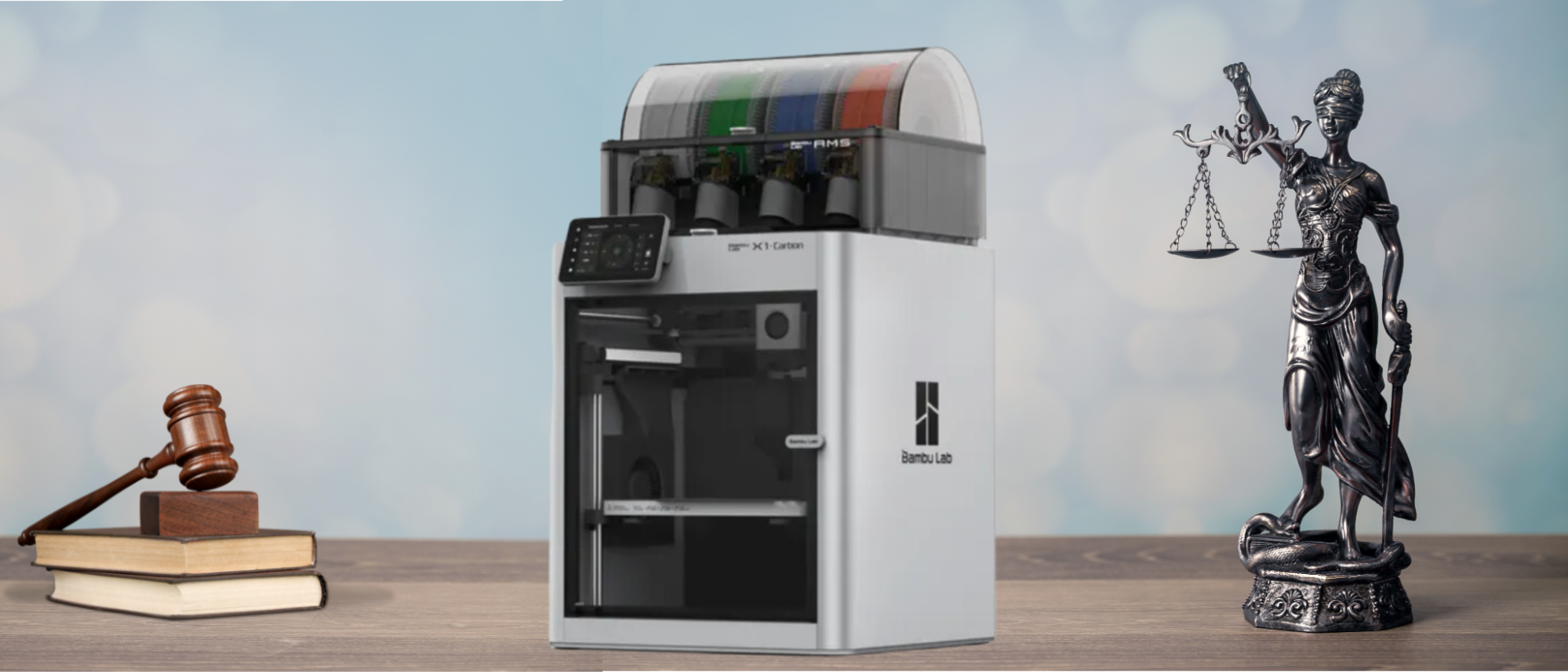
Stratasys, Inc., the company that invented FDM 3D printing, fired shots last week at rising star Bambu Lab for using technology that’s become commonplace in consumer 3D printing. At question is the company’s use of PEI-coated build plates, purge towers, and automatic bed leveling.
Bambu Lab made the following statement on X.com:
We have taken note of the relevant information. As of now, we have not received any formal documents from the court, but we are closely monitoring the situation. We will actively respond to this case in accordance with the appropriate legal procedures to protect our legitimate…August 10, 2024
"We have taken note of the relevant information. As of now, we have not received any formal documents from the court, but we are closely monitoring the situation. We will actively respond to this case in accordance with the appropriate legal procedures to protect our legitimate rights and interests.
Bambu Lab has always advocated for and upheld the principles of respecting and protecting intellectual property. Through continuous research and technological innovation, we strive to provide our users with the best possible 3D printing experience.
We also advocate our industry peers to drive the development of the sector through genuine technological innovation."
Many in the 3D printing community have raised concern that if Bambu Lab can not fight off Stratasys there will be nothing to stop them from going after other manufacturers and driving them out of business.
The Lawsuits
On August 8, 2024, Stratasys, Inc. filed two civil lawsuits in the U.S. District Court for the Eastern District of Texas against Bambu Lab for the alleged infringement of ten different U.S. patents regarding 3D printers. Stratasys was founded in Eden Prairie, MN and still has its North American headquarters there. Bambu Lab, a Chinese company, maintains offices in Austin, TX, which is in the Western Texas District Court. The Eastern District has a reputation for being friendly to patent holders, with U.S. District Judge Alan Albright at one point hearing over 25% of the nation’s patent cases.
Lawsuits can be filed in any US District Court, so long as the Plaintiff can prove that the Defendant resides or does business in that district. Stratasys lawyers have put forth that due to Bambu Lab’s website, it does indeed do business in the Eastern District of Texas.
Oddly enough, the background portion of the suit accuses Bambu Lab of not only selling, marketing and supporting six models of 3D printers in the United States possessing the “accused products”, but also of being a security threat. “Defendant’s printers…transmit data to Defendants’ servers operated by third parties under Defendants’ control. This includes, but is not limited to, Defendants’ servers that may be located in China.”
Stratasys’s co-founder Scott Crump invented the technology behind Fused Deposition Modeling, aka FDM 3D printing, while searching for a faster way to prototype designs in 1988. His first attempt at 3D printing was actually a handheld glue gun filled with a mix of plastic and wax, which he used to make his child a toy frog. He knew he was onto something. So the idea was patented, Stratasys was founded, and 3D printing stayed firmly in the realm of industrial manufacturing for the next 20 years.
Over the years, Stratasys’s wealth of patents kept other inventors from exploring 3D printing. Once the patents began to expire, others were able to enter the 3D printing market and create affordable consumer grade machines.
It’s unclear why Stratasys has not defended their remaining patents, but a popular Reddit thread has a theory why they’re doing it now. Bambu Lab became too popular with businesses and manufacturers. Many believe that Bambu Lab’s more affordable printers have been adopted in great numbers by businesses and are taking a sizable market share from Stratasys. A Bambu Lab X1 Carbon may seem steep for a home workshop at $1449, but a used Stratasys F370 from 2021 will set you back $18,500.
Forbes recently reported that nearly a million desktop 3D printers priced under $2500 shipped during the last quarter of 2023. These printers, like the X1 Carbon, are taking the place of more expensive machines businesses use for prototyping and making small batches of replacement parts.
Whether Stratasys is out to eliminate the competition or merely wants a share of the profits is unclear. However, the precedent for an upstart 3D printing company paying royalties to a more established player has been set. In 2014, Formlabs agreed to pay 3D Systems an 8% royalty on all machines sold.
There are ten patents named in the lawsuit. Some were originally filed by companies that Stratasys has acquired. Here’s a list in order of when they expire:
- US7555357B2, expires 3/3/27, by Stratasys: Method for building 3D objects with extrusion-based layered deposition systems.
- US10569466B2, expires 10/28/28, filed by MakerBot: Tagged build material for 3D printing.
- US8562324B2 expires 8/18/30, filed by MakerBot: Networked 3D printing.
- US8747097B2 expires 8/18/30, filed by MakerBot: Networked 3D printer with 3D Scanner.
- US11167464B2, expires 10/28/33, filed by MakerBot: Tagged build material for 3D printing.
- US9168698B2, expires 2/7/34, filed by MakerBot: 3D printer with force detection.
- US9421713B2, expires 8/20/34, by Stratasys Inc: Method for printing 3D parts with purge towers.
- US11886774B2 expires 12/31/34, filed by Stratasys: Detection and use of printer configuration information.
- US9592660B2, expires 1/8/35, by filed by Arevo Inc, Heated build platform and system for 3D printing methods.
- US10556381B2, expires 7/27/36, filed by MakerBot: 3D printer with force detection.
The original documents can be read here:







